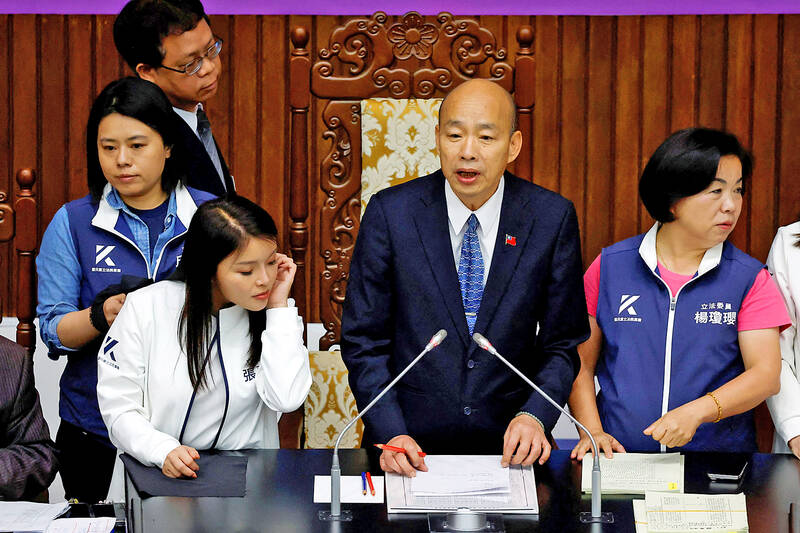Non-medical facilities would no longer be allowed to offer regenerative medicine treatments, and while all regenerative medicine must undergo human trials, the requirement could be conditionally waived for compassionate use, if the legislature passed the Regenerative Medicine Act (再生醫療法) as expected last night.
The human trial requirement would be waived for regenerative medicine uses approved by the central government, the draft states.
Competent authorities would draft and announce conditions for the compassionate use of regenerative medicine, the application process, restrictions on the number of applications allowed, and moral regulations on regenerative medicine, it says.

Photo: Carlos Garcia Rawlins, Reuters
However, treatments for compassionate use cannot use cells or matter from other animals or sources, the draft says.
If passed, the act would formally make the Guide on Moral Policies Involving Human Embryo and Embryonic Stem Cell Research (人類胚胎及胚胎幹細胞研究倫理政策指引) legal.
Under the guide, artificial insemination to create embryos would not be allowed for regenerative medicine research involving embryos or embryonic stem cells.
The guide also bans the creation of hybrids or inserting cell nuclei from other animals or species into enucleated human oocytes, the mass production of embryonic stem cells for research, and creating or propagating chimeric species containing human reproductive cells.
The draft act says that non-medical facilities practicing regenerative medicine, or advertising regenerative medicine services, face a fine of NT$2 million to NT$20 million (US$62,174 to US$621,736).
Those using a regenerative medicine treatment that has not undergone human trials would also be fined NT$200,000 to NT$2 million.
Separately, if amendments to the Regulations on Allowances for Elected Representatives and Subsidies for Village Wardens (地方民意代表費用支給及村里長事務補助費補助條例) passed a third reading, then the monthly subsidy for assistants to NT$320,000 for city and county councilors in municipalities and NT$160,000 for those outside of municipalities would be raised.

Eight restaurants in Taiwan yesterday secured a one-star rating from the Michelin Guide Taiwan for the first time, while three one-star restaurants from last year’s edition were promoted to two stars. Forty-three restaurants were awarded one star this year, including 34 in Taipei, five in Taichung and four in Kaohsiung. Hosu (好嶼), Chuan Ya (川雅), Sushi Kajin (鮨嘉仁), aMaze (心宴), La Vie by Thomas Buhner, Yuan Yi (元一) and Frassi in Taipei and Front House (方蒔) in Kaohsiung received a one-star rating for the first time. Hosu is known for innovative Taiwanese dishes, while Chuan Ya serves Sichuan cuisine and aMaze specializes

Taitung County is to launch charter flights to Malaysia at the end of this year, after setting up flights to Vietnam and Thailand, the Taitung County Government said yesterday. The new charter flight services, provided by low-cost carrier Batik Air Malaysia, would be part of five-day tour packages for visits to Taitung County or Malaysia. The Batik Air charter flight, with about 200 seats, would take Malaysian tourists to Taitung on Dec. 30 and then at 12:35pm return to Kuala Lumpur with Taiwanese tourists. Another charter flight would bring the Taiwanese home on Jan. 3 next year, arriving at 5:30pm, before taking the

Taiwan High Speed Rail Corp. (THSRC) plans to ease strained capacity during peak hours by introducing new fare rules restricting passengers traveling without reserved seats in 2026, company Chairman Shih Che (史哲) said Wednesday. THSRC needs to tackle its capacity issue because there have been several occasions where passengers holding tickets with reserved seats did not make it onto their train in stations packed with individuals traveling without a reserved seat, Shih told reporters in a joint interview in Taipei. Non-reserved seats allow travelers maximum flexibility, but it has led to issues relating to quality of service and safety concerns, especially during

An exhibition celebrating Taiwan and Japan’s comic culture opened on Saturday in Taichung, featuring a section that explores Taiwanese reproductions of Japanese comics from when martial law limited Japanese representation. “A Century of Manga Culture: An Encounter of Taiwan and Japan’s Youth” held its Taiwan opening ceremony at Taichung’s National Taiwan Museum of Comics after an initial one-month run in Japan’s Kyoto International Manga Museum between May 24 and June 24. Much like the Kyoto exhibition, the show mainly celebrates the comic connection between Taiwan and Japan through late Taiwanese comic book